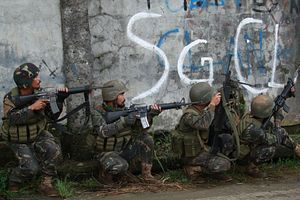Following the attacks in Marawi City by the Islamic State-aligned Abu Sayyaf and Maute Groups, the declaration of martial law in the Philippine region of Mindanao creates a desperate situation for the people and the stability of Mindanao. Military operations and repressive actions will more likely increase the extremist violence than subdue it.
Given the history of the Philippines and the abhorrent record of the Duterte administration, as seen by his “war on drugs,” the return of martial law to Mindanao is an ominous sign of the violence and bloodshed which will certainly follow. The potential scale of the looming atrocities is buried at the crossroads of the history of the Islamic extremism in the Philippines and President Rodrigo Duterte’s disregard for human rights and the value of human life.
The current trend of government violence is seen through the war on drugs taking place across the Philippines. The counter-narcotic operations, which have left over 7,000 people slain across the country, have consisted of large-scale extrajudicial killings and monetary payments based upon body count. This seemingly large number of deaths becomes mind-blowing when put into the framework of violence escalation. Of the 7,000 killings that have taken place since Duterte took office in June of last year, 2,500 were at the hands of the police. The number of police killings recorded for the first half of 2016 was 68.
The most concerning aspect of this pattern of violence is that it takes place with not only the consent of the highest levels of government, but the explicit endorsement of the Philippine president. Rather than reigning in the violence in response to calls for official investigations, Duterte has suggested that police should seize the momentum in the drug war and push on. This appreciation of brutal tactics as a governing tool is now being brought into the efforts to address the powder keg of extremist violence rooted in Mindanao.
Martial Law and Extremism
A brief assessment of the Islamic independence movement in Mindanao shows that the legacy of the extremist violence that Duterte intends to squash stems directly from the repressive military action carried out by during the period of martial law declared in the 1970s under the Marcos regime.
Ferdinand Marcos declared martial law in 1971 in response to the reciprocal violence between armed Muslim and Christian groups that followed the Jabidah Massacre. Rather than suppressing the armed groups, operations by the Armed Forces of the Philippines lead to a consolidation of Islamic independence groups under Nur Misuari and the Moro National Liberation Front (MNLF), which managed to field 30,000 fighters and tie up 80 percent of the armed forces in the resulting conflict.
Since this inception point of the coordinated Islamic independence efforts, the Philippines has grappled with campaigns of violence from the Islamic independence movement in its southern regions for nearly five decades.
Mindanao itself has endured repeated waves of extremist attacks. While hundreds of attacks have brought about thousands of casualties, many of the Islamic independence groups receive extensive support from the Moro people. These extremist groups claim to represent the people, and state their intentions to provide security and protect them. Repressive actions by government forces have served to validate this narrative and increase support for the extremist organizations opposing the government.
A successful peace process with the MNLF led to the establishment of the Autonomous Region of Muslim Mindanao, and left the Moro Islamic Liberation Front (MILF) and the much smaller Abu Sayyaf Group (ASG), both splinter groups from the MNLF, as the primary remaining forces that were carrying out campaigns of extremist violence.
More than a decade of negotiations with the MILF has brought an unstable peace between their 10,000 members and the government of the Philippines. Neither side has yet implemented the stipulations of their agreements, and tension has flared on several occasions. The declaration of martial law, the influx of government troops, and repressive military operations may derail the already shaky peace, which will likely result in MILF militants returning to the battlefield alongside those of the Abu Sayyaf and Maute Groups. Ironically, these groups are splinter organizations, remnants of groups formed at the time of the Marcos regime martial law.
The Moro people are not known for relenting under military pressure and will likely be mobilized in response. Rather than putting down and punishing these terrorist groups, Duterte’s declaration will produce increased support and resources for the militants, which is one of the greatest liabilities of using repressive force in counterterrorism operations.
In order to avoid this looming catastrophe, the government of the Philippines would do well to hold off on operations by the armed forces, and encourage MILF forces to take up the task of subduing the extremist forces in exchange for finalizing the peace accords. This undertaking would not only establish the credibility and capability of the MILF in the region they seek to govern, but it would also build trust and support between the group and the Philippine government. Most importantly it will keep the Moro people on the side of stability and prevent their support of extremist groups that claim to represent them.
Anthony Hustedt is a graduate student of political science at Purdue University, specializing in International Security and Homeland Defense.

































